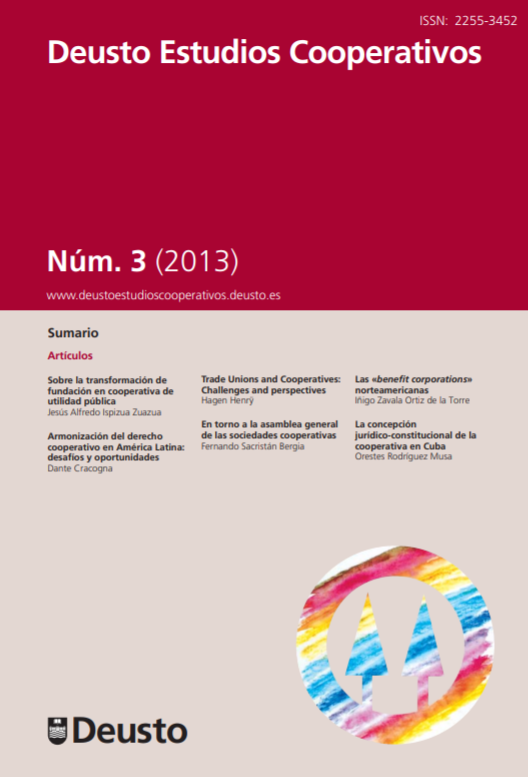Trade Unions and Cooperatives: Challenges and perspectives
Abstract
Based on the International Labour Organisation’s Promotion of Cooperatives Recommendation 2002 (no. 193), this article examines the transitioning from informal to formal players by forming cooperatives. The ILO has a long tradition of work on the subject of informal economies. The problem was first addressed in 1972 and Recommendation no. 193 (paragraph 9) proposes « transformation of what are often marginal survival activities (sometimes called «informal economy») into legally protected work, fully integrated into the mainstream of economic life». The ILO’s idea of (in)formal is a legal concept. This article examines several of the paragraphs in Recommendation no. 193, which the author considers to form part of Public International Cooperative Law. He aims to study the way they have been interpreted by lawmakers and to what extent their implementation has effectively served to transition from informal to formal. Although there are a growing number of players in informal economies across the world, the author does not have doubts as to the effectiveness of the law in formalising these economies. It is also important to note that the complex nature of cooperatives should temper enthusiasm concerning the potential of solving economic, social and human problems related to informal economies in this manner.
Recibido: 18 abril 2013
Aceptado: 12 junio 2013
Downloads
The authors, by submitting their manuscripts to the Deusto Estudios Cooperativos (DEC), accept the conditions listed below on copyright and undertake to comply with them. They do not sign any document of assignment of rights to the Publisher.
1. Authorship: The author must be the sole creator of the work or legally acting on behalf of and with the full agreement of all the authors.
2. Copyright and Code of conduct:
a) Authors warrant that their work is original; has not been previously copyrighted or published in any form; is not under consideration for publication elsewhere; its submission and publication do not violate the Ethical Guidelines of DEC and any codes (of conduct), laws or any rights of any third party; and no publication payment by the Publisher (University of Deusto) is required.
b) Authors grant to the Publisher the worldwide, sub-licensable, and royalty-free right to exploit the work in all forms and media of expression, now known or developed in the future, for educational and scholarly purposes.
c) Authors retain the right to present, display, distribute, develop, and republish their work to progress their scientific career provided the original publication source (DEC) is properly acknowledged.
d) Authors warrant that no permissions or licences of any kind have been granted or will be granted that might infringe the rights granted to the Publisher.


3.jpg)
3.jpg)







